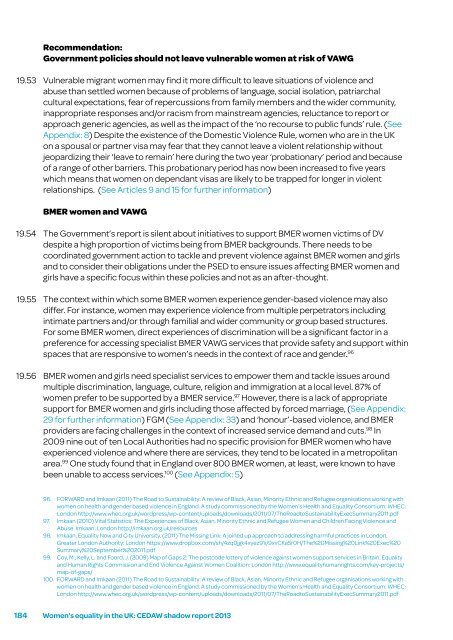Women’s equality in the UK – A health check
Women’s equality in the UK – A health check
Women’s equality in the UK – A health check
Create successful ePaper yourself
Turn your PDF publications into a flip-book with our unique Google optimized e-Paper software.
19.53<br />
19.54<br />
19.55<br />
19.56<br />
Recommendation:<br />
Government policies should not leave vulnerable women at risk of VAWG<br />
Vulnerable migrant women may f<strong>in</strong>d it more difficult to leave situations of violence and<br />
abuse than settled women because of problems of language, social isolation, patriarchal<br />
cultural expectations, fear of repercussions from family members and <strong>the</strong> wider community,<br />
<strong>in</strong>appropriate responses and/or racism from ma<strong>in</strong>stream agencies, reluctance to report or<br />
approach generic agencies, as well as <strong>the</strong> impact of <strong>the</strong> ‘no recourse to public funds’ rule. (See<br />
Appendix: 8) Despite <strong>the</strong> existence of <strong>the</strong> Domestic Violence Rule, women who are <strong>in</strong> <strong>the</strong> <strong>UK</strong><br />
on a spousal or partner visa may fear that <strong>the</strong>y cannot leave a violent relationship without<br />
jeopardiz<strong>in</strong>g <strong>the</strong>ir ‘leave to rema<strong>in</strong>’ here dur<strong>in</strong>g <strong>the</strong> two year ‘probationary’ period and because<br />
of a range of o<strong>the</strong>r barriers. This probationary period has now been <strong>in</strong>creased to five years<br />
which means that women on dependant visas are likely to be trapped for longer <strong>in</strong> violent<br />
relationships. (See Articles 9 and 15 for fur<strong>the</strong>r <strong>in</strong>formation)<br />
BMER women and VAWG<br />
The Government’s report is silent about <strong>in</strong>itiatives to support BMER women victims of DV<br />
despite a high proportion of victims be<strong>in</strong>g from BMER backgrounds. There needs to be<br />
coord<strong>in</strong>ated government action to tackle and prevent violence aga<strong>in</strong>st BMER women and girls<br />
and to consider <strong>the</strong>ir obligations under <strong>the</strong> PSED to ensure issues affect<strong>in</strong>g BMER women and<br />
girls have a specific focus with<strong>in</strong> <strong>the</strong>se policies and not as an after-thought.<br />
The context with<strong>in</strong> which some BMER women experience gender-based violence may also<br />
differ. For <strong>in</strong>stance, women may experience violence from multiple perpetrators <strong>in</strong>clud<strong>in</strong>g<br />
<strong>in</strong>timate partners and/or through familial and wider community or group based structures.<br />
For some BMER women, direct experiences of discrim<strong>in</strong>ation will be a significant factor <strong>in</strong> a<br />
preference for access<strong>in</strong>g specialist BMER VAWG services that provide safety and support with<strong>in</strong><br />
spaces that are responsive to women’s needs <strong>in</strong> <strong>the</strong> context of race and gender. 96<br />
BMER women and girls need specialist services to empower <strong>the</strong>m and tackle issues around<br />
multiple discrim<strong>in</strong>ation, language, culture, religion and immigration at a local level. 87% of<br />
women prefer to be supported by a BMER service. 97 However, <strong>the</strong>re is a lack of appropriate<br />
support for BMER women and girls <strong>in</strong>clud<strong>in</strong>g those affected by forced marriage, (See Appendix:<br />
29 for fur<strong>the</strong>r <strong>in</strong>formation) FGM (See Appendix: 33) and ‘honour’-based violence, and BMER<br />
providers are fac<strong>in</strong>g challenges <strong>in</strong> <strong>the</strong> context of <strong>in</strong>creased service demand and cuts. 98 In<br />
2009 n<strong>in</strong>e out of ten Local Authorities had no specific provision for BMER women who have<br />
experienced violence and where <strong>the</strong>re are services, <strong>the</strong>y tend to be located <strong>in</strong> a metropolitan<br />
area. 99 One study found that <strong>in</strong> England over 800 BMER women, at least, were known to have<br />
been unable to access services. 100 (See Appendix: 5)<br />
96. FORWARD and Imkaan (2011) The Road to Susta<strong>in</strong>ability: A review of Black, Asian, M<strong>in</strong>ority Ethnic and Refugee organisations work<strong>in</strong>g with<br />
women on <strong>health</strong> and gender based violence <strong>in</strong> England. A study commissioned by <strong>the</strong> <strong>Women’s</strong> Health and Equality Consortium. WHEC:<br />
London http://www.whec.org.uk/wordpress/wp-content/uploads/downloads/2011/07/TheRoadtoSusta<strong>in</strong>abilityExecSummary2011.pdf<br />
97. Imkaan (2010) Vital Statistics: The Experiences of Black, Asian, M<strong>in</strong>ority Ethnic and Refugee Women and Children Fac<strong>in</strong>g Violence and<br />
Abuse. Imkaan: London http://imkaan.org.uk/resources<br />
98. Imkaan, Equality Now and City University. (2011) The Miss<strong>in</strong>g L<strong>in</strong>k: A jo<strong>in</strong>ed up approach to address<strong>in</strong>g harmful practices <strong>in</strong> London.<br />
Greater London Authority: London https://www.dropbox.com/sh/4zq0jgk4xyez91i/9xvCKa5r0H/The%20Miss<strong>in</strong>g%20L<strong>in</strong>k%20Exec%20<br />
Summary%20September%202011.pdf<br />
99. Coy, M., Kelly, L. and Foord, J. (2009) Map of Gaps 2: The postcode lottery of violence aga<strong>in</strong>st women support services <strong>in</strong> Brita<strong>in</strong>. Equality<br />
and Human Rights Commission and End Violence Aga<strong>in</strong>st Women Coalition: London http://www.<strong>equality</strong>humanrights.com/key-projects/<br />
map-of-gaps/<br />
100. FORWARD and Imkaan (2011) The Road to Susta<strong>in</strong>ability: A review of Black, Asian, M<strong>in</strong>ority Ethnic and Refugee organisations work<strong>in</strong>g with<br />
women on <strong>health</strong> and gender based violence <strong>in</strong> England. A study commissioned by <strong>the</strong> <strong>Women’s</strong> Health and Equality Consortium. WHEC:<br />
London http://www.whec.org.uk/wordpress/wp-content/uploads/downloads/2011/07/TheRoadtoSusta<strong>in</strong>abilityExecSummary2011.pdf<br />
184 <strong>Women’s</strong> <strong>equality</strong> <strong>in</strong> <strong>the</strong> <strong>UK</strong>: CEDAW shadow report 2013


